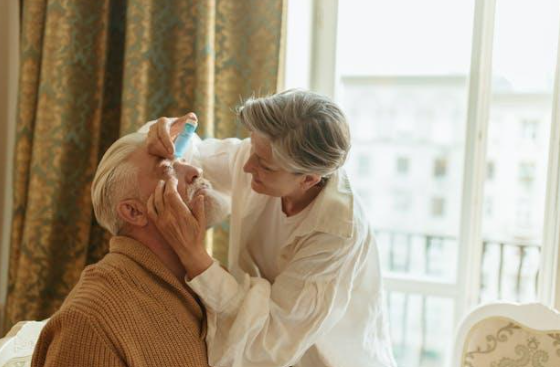Managing Fall Allergies: Protecting Your Eyes from Seasonal Irritants
Managing Fall Allergies: Protecting Your Eyes from Seasonal Irritants

People enjoy fall because it brings cool weather, colorful leaves, and some cozy traditions. However, many also dread fall because it is also the season that brings sneezing, congestion, itchy skin, and irritated eyes. If your eyes feel red, watery, or itchy during fall, you're not alone.
Let us walk you through what causes fall eye allergies, how they affect your eyes, and what you can do to manage symptoms and protect your vision.
Fall Triggers to Watch Out For
Eye allergies, also known as allergic conjunctivitis, happen when the eyes react to something in the environment. When your body senses these triggers, it releases histamines, which cause swelling, itching, and watering in your eyes. Here are some of the main triggers in fall:
- Ragweed: This plant, which looks pretty ordinary, makes a crazy amount of tiny pollen bits. These bits are super light and can float for miles in the wind. Ragweed season usually lasts from late summer until the first cold day in winter.
- Mold Spores: Mold can also grow inside your house, especially in damp places like basements or bathrooms. They send out tiny invisible "spores" into the air. When you're playing in leaves or walking in the woods, these spores can get kicked up and float into your eyes.
- Dust Mites: These tiny bugs love warm, slightly humid places like your bed, couches, and carpets. Their droppings can get stirred up in the air when you close up your house for fall and turn on the heat. For many people, this causes itchy, watery eyes even when they're inside.
- Pet Dander: Sometimes, pet dander (tiny flakes of skin from pets) can also bother your eyes, especially in the fall when pets spend more time inside, making their dander build up more in your home.
Differentiating Eye Allergies from Other Conditions
It’s easy to mistake eye allergies for other problems like viral conjunctivitis (pink eye) or dry eye syndrome. Allergies typically cause itchy, watery, and red eyes, often affecting both eyes at the same time. Unlike infections, they aren’t contagious and respond well to antihistamines and cool compresses.
Viral conjunctivitis may begin in one eye and spread to the other, often appearing alongside cold symptoms like a runny nose or sore throat. This type is contagious and usually clears up with rest and proper hygiene.
Dry eye syndrome causes a stinging or gritty sensation and blurry vision, particularly after long hours on screens. It’s not contagious, and treatment often involves lubricating drops and adjustments to screen time or air quality.
If your symptoms persist or become more severe, it’s best to check in with an eye care provider to get a clear diagnosis and proper treatment.
Eye-Friendly Tips for Managing Fall Allergies
Lifestyle changes and smart habits can make a huge difference in managing your fall eye allergies.
Keeping Windows Closed
When the weather starts to cool down, it's tempting to throw open the windows to let in crisp autumn air. Keeping them closed during peak pollen times, usually mid-morning to early evening, can help you avoid outdoor allergens. Alternately, you can air conditioning or air purifiers with HEPA filters to maintain indoor air quality.
Tackle Dust and Dander
Regularly vacuum your carpets and upholstered furniture, ideally with a vacuum cleaner that has a HEPA filter. Damp-dust hard surfaces to trap allergens instead of just pushing them around. You can also regularly wash sheets, pillowcases, and blankets in hot water to kill dust mites and wash away droppings.
Use Protective Eyewear
If you're raking leaves, walking through wooded areas, or spending time outdoors, wear sunglasses or protective glasses. This helps prevent particles like pollen, mold spores, and dust from coming into direct contact with your eyes. Even simple wraparound sunglasses can create a helpful barrier between your eyes and fall allergens.
Rinse Your Eyes Gently
After spending time outside, especially on dry and windy days, consider using preservative-free artificial tears to rinse allergens out of your eyes. These over-the-counter drops can flush away pollen, soothe irritation, and keep your eyes hydrated without the risk of overuse side effects.
Avoid Rubbing Your Eyes
It’s tempting to rub when your eyes itch—but doing so can worsen inflammation and potentially damage the delicate tissues around your eyes. Instead, use a cool, damp compress over your closed eyelids to relieve itching and reduce puffiness without causing more irritation.
When to Seek Professional Help
While many cases of allergic conjunctivitis can be managed at home, some symptoms require medical attention. It’s a good idea to schedule a visit with your eye care provider if:
- Your eye allergy symptoms are severe, cause significant pain, affect your vision, or make you extremely sensitive to light.
- You're seeing a thick, yellow, or green discharge from your eyes, as this could indicate a bacterial infection rather than just allergies.
- Your symptoms don't improve, or they actually get worse, despite trying various over-the-counter treatments for several days.
- You're just not sure what's causing your eye discomfort, or if you have other eye conditions that might make self-treatment risky.
Our
experienced team at Baptist Eye Surgeons can confirm whether you’re dealing with allergies or another condition like viral conjunctivitis or dry eye. Once our doctors know the cause, they can recommend a treatment plan that works for your lifestyle and comfort.
By understanding your triggers and using smart prevention strategies, you can stay clear-eyed and comfortable throughout the season. If you’re struggling with itchy, red, or watery eyes this fall, however, we at
Baptist Eye Surgeons can help. Call us at
(865) 413-5433 to
schedule a visit today to get clear answers and real relief!





